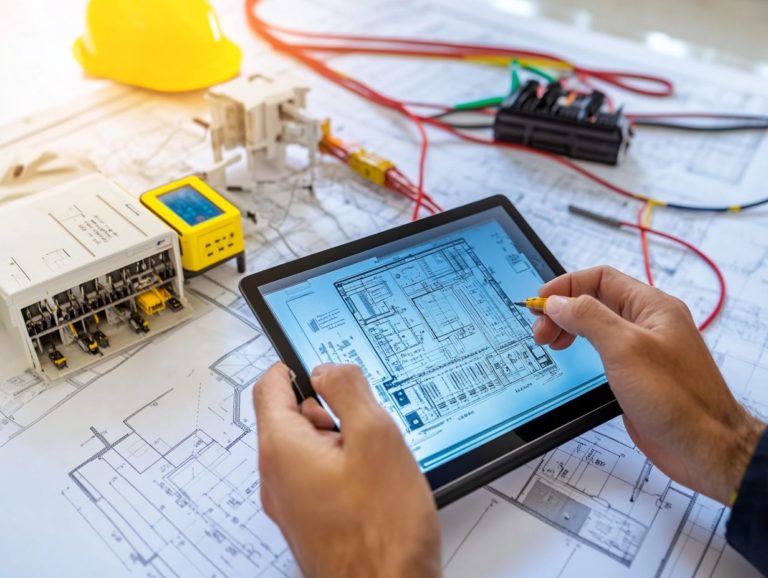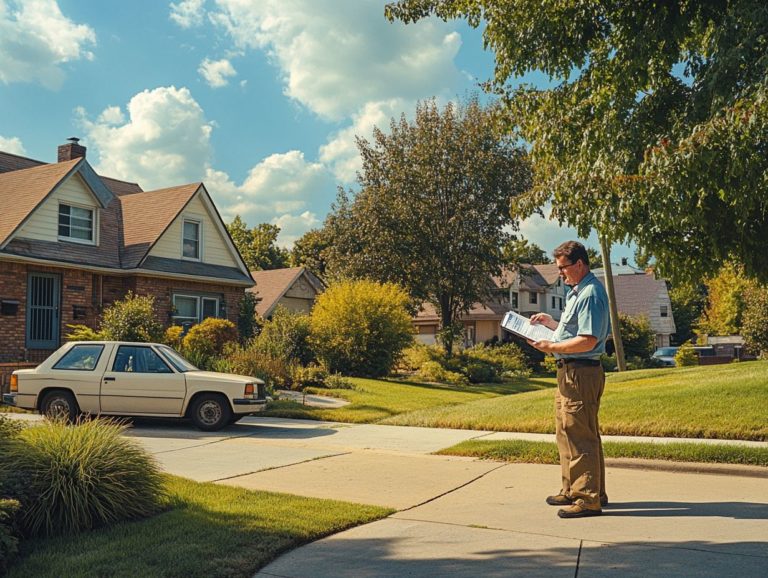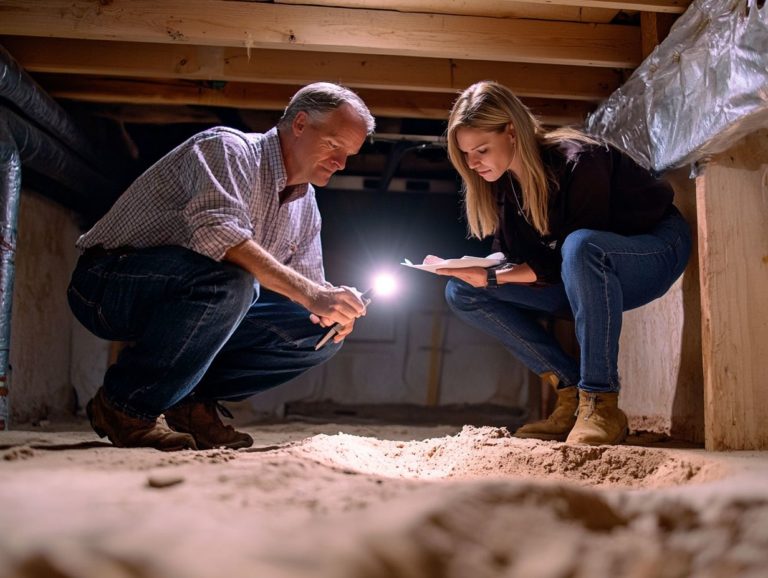Understanding the Home Inspection Process for Sellers
When selling your home, grasping the home inspection process is essential for a successful transaction. Get ready to boost your selling experience with insights that can make your process smoother and more profitable!
This article delineates what a home inspection involves, emphasizing its importance for sellers like you. You ll discover the advantages of a pre-listing inspection and the steps to take beforehand.
We will also explore how to navigate negotiations and finalize the sale after the inspection. We ll guide you through what to expect during the inspection itself, covering common areas that are assessed and how to tackle any issues that may come up.
Contents
- Key Takeaways:
- What is a Home Inspection?
- Why is a Home Inspection Important for Sellers?
- Preparing for a Home Inspection
- What to Expect During a Home Inspection
- Addressing Issues Found During the Inspection
- Closing the Deal After a Home Inspection
- Negotiating and Finalizing the Sale
- Frequently Asked Questions
- What is the purpose of a home inspection for sellers?
- When should sellers schedule a home inspection?
- Who pays for the home inspection?
- What does a home inspector look for during the inspection?
- Can sellers be present during the home inspection?
- What should sellers do with the inspection report?
Key Takeaways:
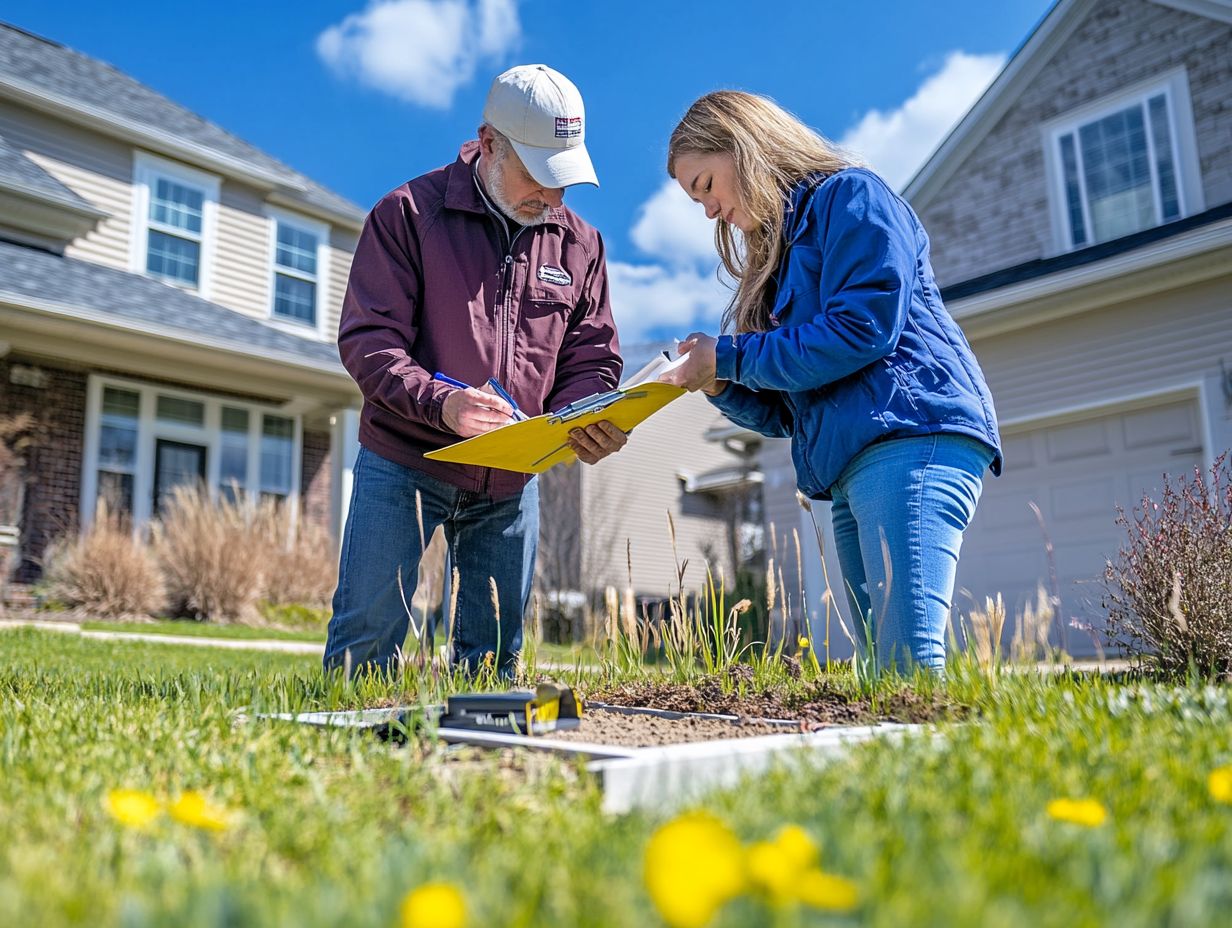
- A home inspection provides buyers with a detailed report on the property’s condition.
- A pre-listing inspection helps sellers identify potential issues early.
- Sellers should declutter and ensure key areas are accessible for the inspector.
What is a Home Inspection?
A home inspection represents a meticulous assessment of a property’s condition. This assessment is carried out by a qualified inspector who follows the rigorous standards established by organizations such as the American Society of Home Inspectors.
This essential process entails a detailed examination of the home’s physical elements, including the heating, ventilation, and air conditioning (HVAC) system, plumbing, and electrical systems. Additionally, structural components and the integrity of the foundation are assessed.
The goal is to uncover any significant issues or defects that might affect the safety and overall value of the property.
Overview of the Process
The home inspection process usually starts with the inspector conducting a detailed physical examination of the property, which is crucial for understanding the home inspector’s role. The timeframe can fluctuate depending on the size and condition of the home.
For buyers, tagging along with the inspector can be immensely beneficial. This firsthand experience allows you to gather insights and gain knowledge about potential issues, fostering a collaborative atmosphere that leads to well-considered choices.
During the inspection, various aspects such as plumbing, electrical systems, and structural integrity are carefully scrutinized. This thorough evaluation reveals vital information that plays a crucial role in effective home maintenance practices down the line.
Why is a Home Inspection Important for Sellers?
For sellers, a home inspection is a critical element of the home selling process. It offers invaluable insights that align with your expectations, paving the way for a smoother transaction and the potential for higher sale prices. Understanding the home inspection process can be beneficial in achieving these goals.
Benefits of a Pre-Listing Inspection
A pre-listing inspection brings a wealth of advantages for you as a seller. It allows you to tackle major repairs proactively, eliminating unwelcome surprises during negotiations.
By identifying potential issues early on, you foster greater transparency and trust with prospective buyers, often resulting in smoother negotiations. This proactive strategy positions your property more favorably in a competitive market while minimizing the chances of buyers demanding significant concessions or renegotiations due to unexpected inspection findings.
When you demonstrate that your home has been well-maintained and thoroughly scrutinized, you elevate its overall appeal. This not only increases the likelihood of a quicker sale but also enhances the chances of securing an attractive price.
Taking this strategic step helps mitigate inspection contingencies, giving you a stronger bargaining position during discussions.
Preparing for a Home Inspection

Preparing for a home inspection is essential for showcasing your property in its finest light. This means ensuring that every corner is spotless and that access to key areas, such as the crawl space, is unobstructed and easy.
Ready to sell your home? Start preparing for your home inspection today!
Steps to Take Before the Inspection
Make a simple checklist of maintenance tasks, repairs, and safety issues. This can boost your chances of a successful inspection.
Start by checking common areas, like:
- Leaks under sinks
- Functional smoke detectors
Clean gutters and downspouts to prevent water damage. Inspect your roof for missing shingles.
These steps help your home pass inspection and create a safer, more comfortable environment.
What to Expect During a Home Inspection
Expect a careful inspection process. The inspector will evaluate key areas like the roof, basement, and major systems while you watch.
This thorough approach ensures everything is checked, giving you confidence in your home s condition.
Common Areas and Systems Inspected
During a home inspection, you can expect a thorough examination of key areas and systems essential for your property’s integrity. This includes critical components like the heating, ventilation, and air conditioning (HVAC) system, plumbing, electrical systems, and the foundation, which is the base of your home.
Inspectors closely examine the HVAC system, assessing its operational capacity and identifying any potential repairs or efficiency issues that could impact your utility bills.
The plumbing inspection is vital; it uncovers hidden leaks or pipe corrosion that could lead to significant water damage over time. Electrical inspections reveal outdated wiring or code violations that could pose safety risks.
Foundation assessments are crucial, as any structural integrity issues can result in costly repairs later. By meticulously examining these areas, inspectors provide invaluable insights that can greatly influence negotiations.
This knowledge enables you to make informed decisions and potentially secure price adjustments or necessary repairs from sellers.
Addressing Issues Found During the Inspection
When issues arise during a home inspection, it’s crucial for you as a seller to understand the significance of repair recommendations.
Understanding how to address substantial repairs based on the home inspection report findings can make a difference in your selling journey.
Options for Repairing or Disclosing Issues

You have several options for addressing issues that arise during the inspection, whether making necessary repairs or providing full disclosure about major flaws.
By weighing the implications of each choice, you can navigate buyer negotiations strategically. For example, opting for repairs can enhance your property’s appeal and instill confidence in potential buyers, often leading to a smoother transaction.
Conversely, full disclosure may increase transparency and build trust but could open the door to negotiations regarding price reductions or repair credits.
Finding the right balance between these strategies requires understanding how repair recommendations can influence buyer perceptions, impacting the closing process and your potential outcomes.
Closing the Deal After a Home Inspection
Closing the deal after a home inspection requires navigating a multifaceted negotiating process. Here, both buyers and sellers must thoughtfully address any issues that arise, potentially invoking an inspection contingency that could significantly influence the final sale price.
Negotiating and Finalizing the Sale
Negotiating and finalizing the sale often revolves around the terms in the inspection report. It’s crucial for both parties to agree on suitable negotiation terms to reach a mutual understanding.
Think of this document as your roadmap; it shows you what to fix before closing the deal!
As you engage in effective negotiation tactics, be prepared for sellers to adjust pricing, while you may present repair requests based on the report’s findings. Clear communication is essential.
Sellers should provide their address and any property details. You should articulate your negotiation strategies with transparency.
By embracing a collaborative approach, both sides can navigate potential pitfalls, increasing the likelihood of a successful transaction.
Frequently Asked Questions
What is the purpose of a home inspection for sellers?
The purpose of a home inspection for sellers is to provide an unbiased evaluation of their home’s condition. This information informs potential buyers about issues that may affect the property’s value or safety. For a deeper insight, understanding the process of home inspections also helps sellers make necessary repairs before listing the home.
When should sellers schedule a home inspection?
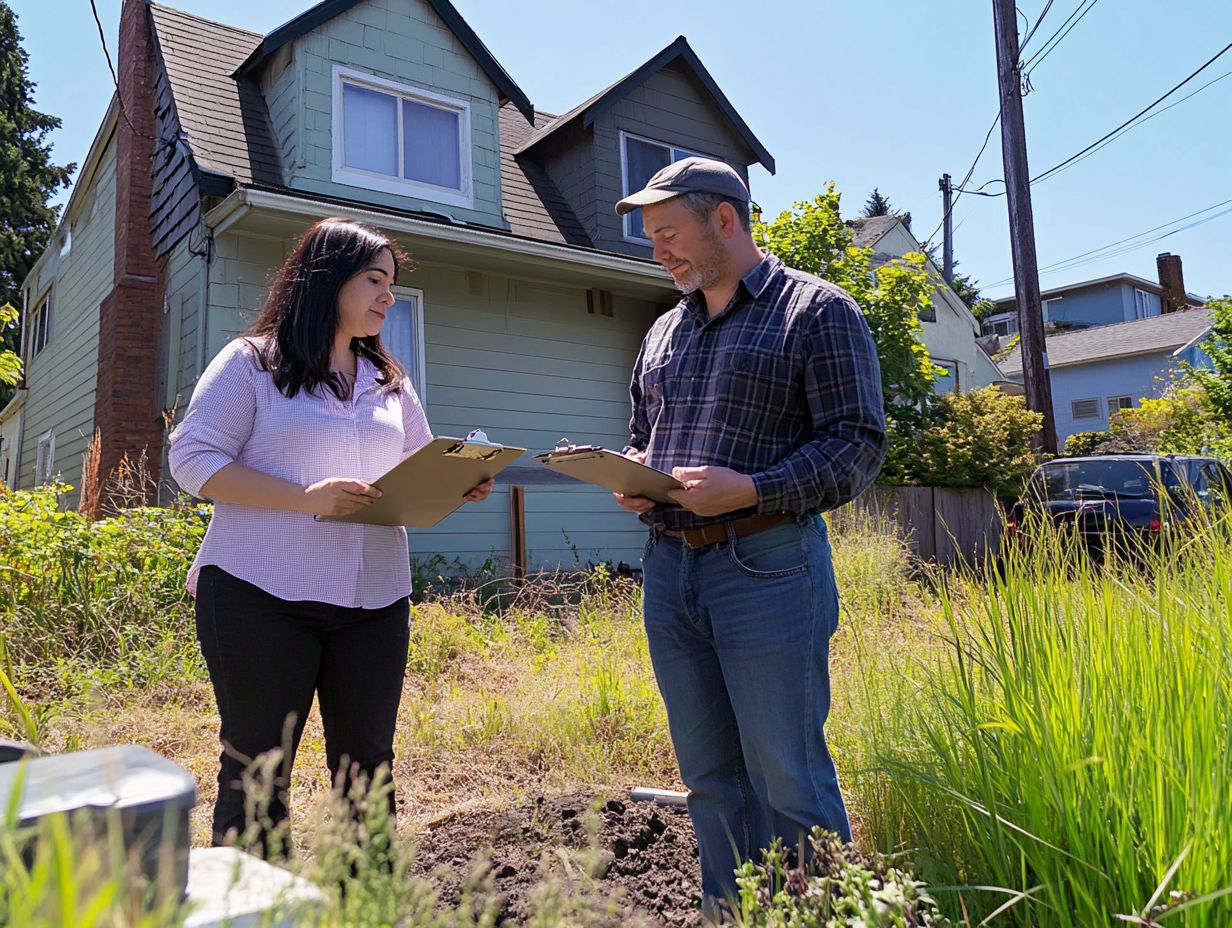
Sellers should schedule a home inspection after accepting an offer. This ensures the buyer is serious and allows the seller time to address any issues that may arise during the inspection, as outlined in the understanding the home inspection timeline.
Who pays for the home inspection?
Typically, the buyer pays for the home inspection. However, some sellers may cover the cost as an incentive for buyers, helping them avoid surprises during negotiations.
What does a home inspector look for during the inspection?
A home inspector checks the overall condition of the home, including the building’s strength and safety, electrical and plumbing systems, heating and cooling systems, roof, and any visible issues inside and outside. They also look for safety hazards or code violations.
Can sellers be present during the home inspection?
Yes, sellers can usually be present during the inspection. However, they should give the inspector space to do their job and avoid influencing the findings. This ensures a fair and unbiased inspection.
What should sellers do with the inspection report?
After the home inspection, sellers should review the report carefully and address identified issues. They can choose to disclose the report to potential buyers or use it to make repairs before listing the home. Additionally, understanding the home inspection process is important, as keeping a copy of the report for future reference can be beneficial.
Address any issues promptly to avoid complications later. Understanding the importance of home inspections can lead to a smooth selling experience, so be sure to get your home inspected today!



